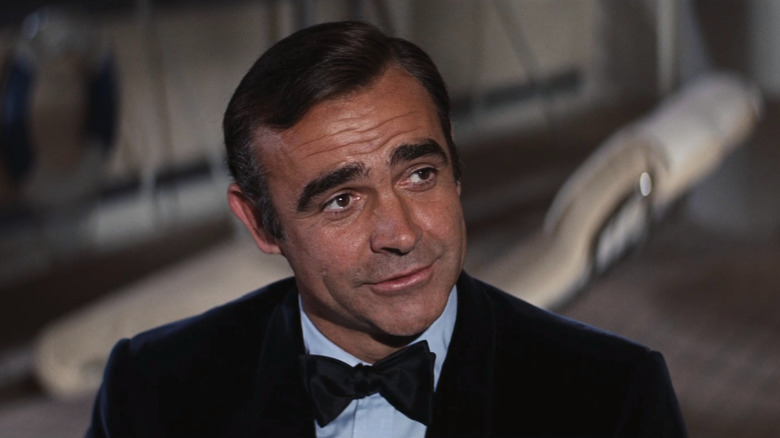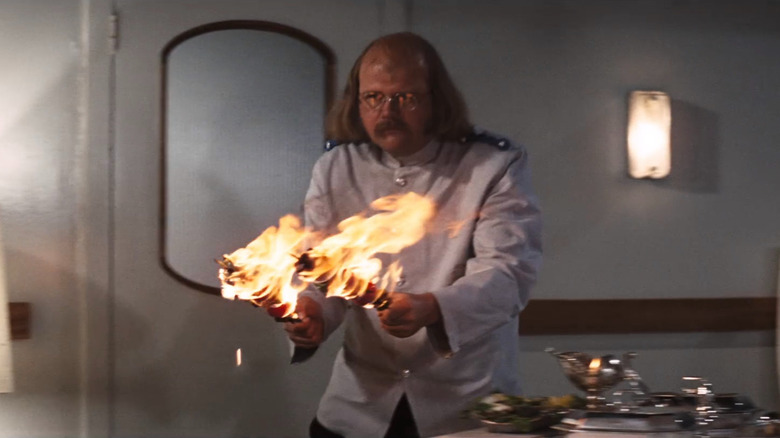The Original Ending Of Diamonds Are Forever Was A Little Too 'S&M' For British Censors
When Sean Connery returned to the James Bond films after skipping out on "On Her Majesty's Secret Service" (which is a great movie but seen as lesser at the time), anticipation was high. In 1971, Connery was Bond. George Lazenby was some pretender. There wasn't a tradition of handing over the character to a new actor yet. This was his grand return, and the film's creatives needed to get it right. They even brought back "Goldfinger" director Guy Hamilton to call the shots.
On a financial level, everyone was happy. "Diamonds Are Forever" was the third-highest grossing film at the domestic box office in 1971. On an artistic level ... it's one of the worst films in the series. Connery is clearly only in it for the paycheck, the story is weirdly low-stakes and silly, and the Las Vegas setting feels chintzy.
The film does have two major bright spots though. First, there's the title song sung by Shirley Bassey, which is exactly the kind of big, brash, sexy number a Bond movie should open with. The other is the main pair of henchmen in the film. Mr. Wint and Mr. Kidd, played by Bruce Glover and Putter Smith respectively, are a couple of weirdos, and I love them. Their energies are unlike that of any other Bond henchmen. Bruce Glover, who is the father of Crispin Glover, has the same spark of strangeness that makes his son so compelling, and Putter Smith isn't even an actor. He's a celebrated jazz bassist, and "Putter" could not be a better name to describe him. You can't take your eyes off these two off-beat, queer-coded henchmen. Their final showdown ends up being one of the sillier moments of an incredibly silly movie, but it wasn't always supposed to be that way.
From S&M to shish kabob
The original ending of "Diamonds Are Forever" was supposed to involve Jill St. John's character, Tiffany Case, being bound to a bed by Mr. Wint and Mr. Kidd. A classic damsel in distress situation for Sean Connery's James Bond to save her from and vanquish the henchmen, customarily after disposing of the main villain (in this case, Charles Gray's Blofeld). However, this was a little too much for the censors to take. Tom Mankiewicz, who wrote "Diamonds" and the first two Roger Moore Bond films, spoke with Caped Wonder in 2006 about why that ending was abandoned:
"It was very weird thing because in those days, and it still holds true, largely, the Brits cared a great deal about violence in terms of your ratings. I had originally had Mr. Wint and Mr. Kidd put a scorpion down the mouth and the Brits said, 'The kids will not be allowed to see that.' Although it's fine with the Americans. Then you saw Lana Wood's breasts for about a quarter of a second and the Americans said, 'No, no, no,' and of course that's fine with the Brits because they are more healthier about that, but the tying her to the bed got a little hot for the censors."
Ultimately, the ending of the film sees Mr. Wint and Mr. Kidd disguised as hotel room service attendants. Glover's Wint attempts to strangle Bond, and in the silliest move, Smith's Kidd sets two shish kabobs a flame to stab Tiffany. Unsurprisingly, neither henchman makes it out alive, with Mr. Kidd's own shish kabobs setting him completely on fire. While it may not be the most exciting final showdown, you can't knock the nonsensical creativity. It's as bizarre as the two men who meet their ends there.

